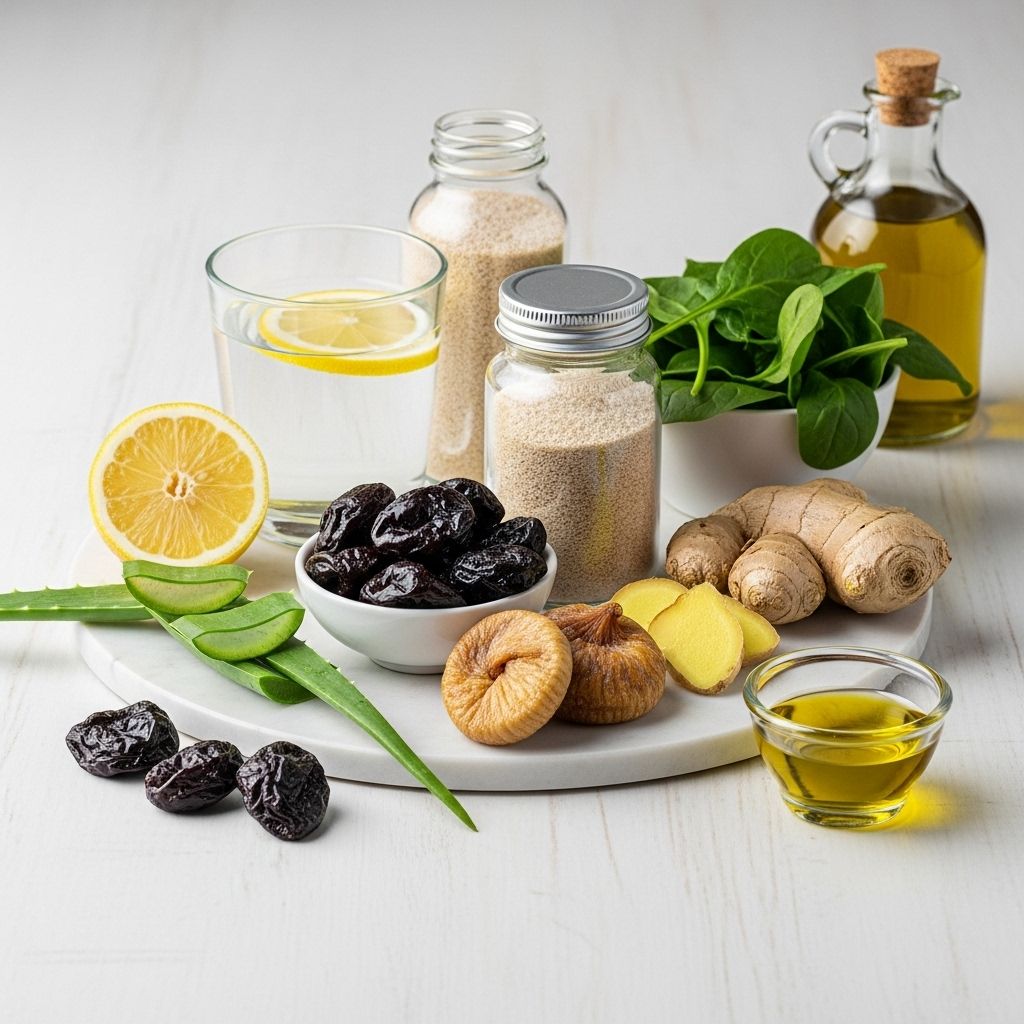Natural Remedies for Constipation
Natural boosts and simple rituals can help restore smooth and comfortable digestion.

Effective Home Remedies for Constipation
Constipation is a common issue affecting many people worldwide, and it can be managed effectively with natural remedies. These remedies not only provide relief but also promote overall health without the side effects often associated with medications. Here are some of the most effective home remedies for constipation:
1. Prune Juice
Prune juice is one of the oldest and most trusted natural remedies for constipation. It is rich in fiber, which helps make the stool bulky and easier to pass. Prunes also contain dihydroxyphenyl isatin, a compound that accelerates colon functioning, and are packed with vitamins and antioxidants.
How to Use:
– Drink one glass of prune juice in the morning and another at night.
– Alternatively, you can eat a couple of prunes instead of drinking the juice.
– Ensure there is a sufficient gap between the two glasses to avoid excessive intake, which can lead to diarrhea.
2. Magnesium
Magnesium plays a crucial role in muscle and nerve function, which is essential for bowel movements. It helps relax the muscles in the digestive tract and can aid in relieving constipation. Magnesium can be consumed through diet or supplements, but it is always recommended to consult a doctor before starting any new supplement regimen.
3. Enema
An enema is a procedure where a liquid is inserted into the rectum via the anus. This can be an effective way to relieve constipation by directly introducing fluid into the bowel to soften stool and stimulate bowel movements. However, it should be used cautiously and not excessively, as it can lead to dependency.
4. Fiber
Fiber is a key component in managing constipation naturally. It helps increase the bulk of stool, making it easier to pass. Foods rich in fiber include whole wheat bread, unrefined cereals, citrus fruits, and vegetables. Increasing fiber intake gradually is recommended to avoid discomfort.
5. Castor Oil
Castor oil is known for its laxative properties. It stimulates the bowel muscles to move and can help relieve constipation. However, it should be used with caution, as it can cause stomach cramps and diarrhea in some individuals.
6. Lactulose
Lactulose is a commonly used laxative that softens stool by pulling water from the colon. It is safe for use in both adults and children but should be taken under medical supervision, especially in infants.
7. Herbal Teas
Herbal teas are natural laxatives that can help ease constipation. They work by causing water retention in the colon, which leads to smoother stools that pass more easily. Some of the best herbal teas for constipation relief include green tea, peppermint tea, and black tea. Adding honey or molasses can enhance their laxative properties.
8. Olive Oil
Olive oil acts as a natural laxative by smoothing the intestinal walls, making it easier for stool to pass. It can be taken on an empty stomach in the morning or used in cooking to aid digestion.
9. Coconut Oil
Coconut oil contains medium-chain fatty acids that can help alleviate constipation. It can be consumed in small amounts daily, starting with half a tablespoon in the morning and half at night, and gradually increasing as needed.
10. Baking Soda
Baking soda can help neutralize stomach acid and promote bowel movements. Mixing one teaspoon of baking soda with water can create a natural laxative effect, although it should be used sparingly due to potential side effects.
11. Triphala
Triphala is an herbal blend that has been used for centuries to promote digestive health. It helps regulate bowel movements and can be consumed as a powder or tea. Mixing it with warm water is a common practice for relieving constipation naturally.
12. Vitamins
Certain vitamins, particularly vitamin C and B vitamins, are important for maintaining healthy digestion. While they may not directly treat constipation, they support overall gut health.
13. Wheat Bran
Wheat bran is high in insoluble fiber, which can help increase stool bulk and facilitate bowel movements. However, it may cause gas and bloating in some individuals, so it should be introduced gradually into the diet.
Conclusion
Managing constipation naturally involves a combination of dietary changes, herbal remedies, and lifestyle adjustments. These home remedies can provide quick relief and support long-term digestive health.
Frequently Asked Questions (FAQs)
Q: What are the best natural remedies for constipation?
A: Prune juice, magnesium, herbal teas, olive oil, and coconut oil are among the most effective natural remedies for constipation relief.
Q: How does fiber help with constipation?
A: Fiber increases the bulk of stool, making it easier to pass. Foods rich in fiber include whole grains, fruits, and vegetables.
Q: Are herbal teas safe for children?
A: Yes, herbal teas like peppermint and green tea are generally safe for children when consumed in moderation.
Q: Can I use baking soda frequently?
A: Baking soda should be used sparingly due to potential side effects like gas and bloating with excessive intake.
References
- https://www.stylecraze.com/articles/effective-home-remedies-to-cure-constipation/
- https://pmc.ncbi.nlm.nih.gov/articles/PMC3348737/
- https://www.stylecraze.com/articles/is-oatmeal-good-for-constipation/
- https://www.youtube.com/stylecraze
- https://pmc.ncbi.nlm.nih.gov/articles/PMC2794454/
- https://www.aarp.org/health/conditions-treatments/fast-constipation-relief/
Read full bio of Sneha Tete












